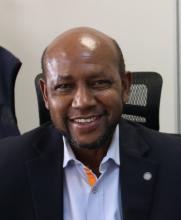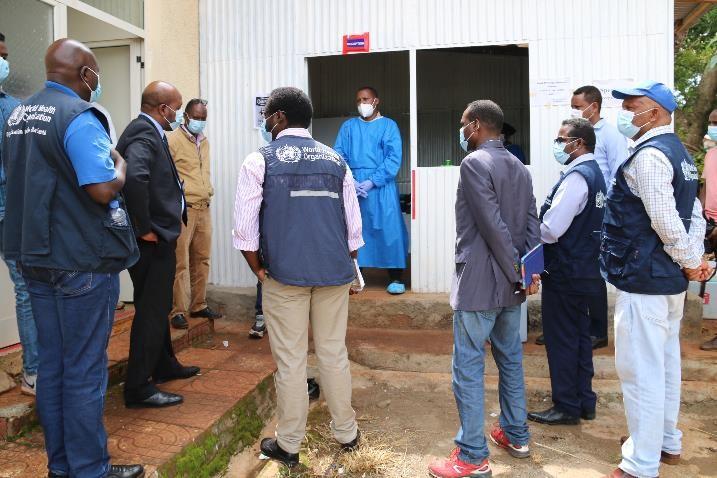Ethiopia has increased its health workforce by recruiting 23,387 additional health workers to respond to the COVID-19 crisis and to ensure that essential health services are continued. It has also provided training to health workers to ensure safe and hygienic practices in all health settings.
A solid response to COVID-19 depends on there being enough health workers at all levels, especially at community level, to ensure that people are optimally aware and protected against the virus and that they continue to access other essential health services.
Health services are available to all people nationwide, including in the rural areas, for both COVID-19 prevention and treatment and other essential health services.
WHO has provided robust coordination and valuable technical support to assess and address additional health workforce requirements, and continues to provide strategic assistance for Ethiopia’s national response to COVID-19.

"Getting our health workforce ready was one of the most important steps in the COVID-19 response. We had to make sure that our health workers were not only available but also prepared and felt sufficiently safe to serve at the frontlines of the pandemic response.”

"Globally and in Ethiopia, health workers have been the heart and soul of the COVID-19 response. WHO has been working closely with the Federal Ministry of Health and the Regional States by supporting the regional health bureaus to build capacity, train and protect front-line health workers who are working tirelessly and even by putting their lives at risk in the war against COVID-19, not to forget those who work tirelessly from home to support the ongoing emergency response operations. We value and appreciate the sacrifices our health heroes.”

"I would like to acknowledge the critical role played by our health workers in the COVID-19 response in Ethiopia. Without their commitment and support, we would not have been able to wage a strong national response to COVID-19. Yet again, this pandemic has shown us that there is no health and security without health workers. As they work tirelessly to protect us, we must do all within our means to appreciate and protect them. I am thankful to WHO for their continued help and support.”
THE LONG READ
In a busy intensive care unit in Eka Kotebe General Hospital, Addis Ababa, Dr Samuel Getnet, 28, a newly-recruited young and energetic physician anxiously monitors the mechanical ventilators, an indispensable form of life support for COVID-19 patients with respiratory distress.
“I never thought my professional journey would bring me to the place where I’m today – at the center of COVID-19 pandemic management team – treating and caring for the most severely ill patients who critically need my support and care. Despite the challenges and risks, I am grateful for the opportunity to serve my people at this critical time,” he said.
Dr Getnet is a general practitioner who came on board as part of the surge capacity planning for human resources announced by the Ethiopian Ministry of Health in February 2020. He did not have any prior skill and knowledge on COVID-19 prevention and management practices. Before starting his duty in the intensive care unit, he received in-person training from the World Health Organization (WHO), with practical sessions taking place in the hospital. The topics he covered include case management, use of personal protective equipment (PPE), infection prevention and control (IPC), and the application and use of mechanical ventilation. He also benefited from online WHO resources such as Open WHO.org.
Since the beginning of the pandemic, WHO, through the UHC Partnership, has been supporting the Government and Ministry of Health to increase the number of health workers and improve their skills in order to provide emergency care for COVID-19 patients, prevent new infections and maintain essential health services. This work builds on the existing Ethiopian health workforce extension programme, the community health programme and other strategic investments already made to strengthen the health system.

©WHO Ethiopia
Preparing the health workforce for action
With COVID-19 spreading across the country, Ethiopia knew that one of its best defences was to prepare the health workforce. Health workers perform many vital roles in both normal times and in times of crisis. The Government knew that in order to both treat COVID-19 patients and maintain essential services, more health workers were needed.
“I would like to acknowledge the critical role played by our health workers in the COVID-19 response in Ethiopia. Without their commitment and support, we would not have been able to wage a strong national response to COVID-19. Yet again, this pandemic has shown us that there is no health and security without health workers. As they work tirelessly to protect us, we must do all within our means to appreciate and protect them. I am thankful to WHO for their continued help and support,” said H.E. Dr Dereje Duguma, State Minister of Health, Ethiopia.

Photo Credit: Ministry of Health
Emergency COVID-19 response
The first case of COVID-19 was detected in Ethiopia on 13 March 2020. As of 26 October 2020, Ethiopia has identified 93,707 cases and had 1,437 deaths. The Government took steps to mitigate the spread of the virus, including the establishment of an emergency operations centre and an appointment of a national incident manager. Schools were closed and a state of emergency was declared with a series of measures including closure of places of worship, prohibition of mass gatherings, closure of borders and limiting flights.
A national committee led by the Prime Minister was established to lead and provide high-level guidance and mobilize resources. A Disaster and Risk Management Council led by the Deputy Prime Minister was also established to oversee the overall response. A multi-sectoral Public Health Emergency Management task force led by Minister of Health and a Technical Task force led by the Director General of the Ethiopian Public health Institution were likewise established and activated. In both taskforces, WHO has coordinated other partners and has been actively involved in planning, implementing and monitoring the national emergency response.
The Government has taken commendable actions to ensure adequate quarantine, isolation and treatment facilities and also laboratory capacities for COVID-19 testing, screening and emergency operation centres. Case management, IPC protocols and guidance were also developed and disseminated to the isolation and treatment centers in Addis Ababa and the regions. All these are vital aspects of the response. However, also critical is the role of health workers and WHO has supported the Government to increase the capacity of the health workforce to deal with the crisis.

©WHO/Loza Tesfaye
More health care workers are needed for the national response
The need to both respond to COVID-19 and continue to provide other essential health services ultimately requires more health workers on the ground. However, Ethiopia is one of the 57 countries in the world with a chronic shortage of health workers. To help urgently address this, WHO’s support to Ethiopia has been largely focused on helping the Human Resources for Health Directorate of the Ministry of Health and the Ethiopian Public Health Institution to forecast needs, map, recruit, train and deploy health workers in response to the pandemic.
“Getting our health workforce ready was one of the most important steps in the COVID-19 response. We had to make sure that our health workers were not only available but also prepared and felt sufficiently safe to serve at the frontlines of the pandemic response,” said Assegid Samuel, Director, Human Resource for Health Directorate, Ministry of Health.

©WHO/Alemtsehay
WHO initially provided support in estimating the health workforce necessary for acute and intensive care over the course of the pandemic. An Excel-based simulation tool was used to provide a quick but reliable evidence-based estimation of the impact of COVID-19 in a country. The tool gives estimates on the results of the infection such as the numbers of people who are at risk of infection, exposed to the infection, actually infected with the virus, in need of hospitalization, killed by, or recovered from the infection. It provides information on the requirements and preparations to respond to the disease, such as PPE kits, ventilators, and other materials, and also estimates the number of health workers needed to respond to the pandemic.
Using results from the simulation tool, the Government then made plans to recruit 45,000 health care providers of different professional categories in addition to the 104,506 health professionals currently working in the health system.
Recognizing the potential burnout of the existing health workforce and the need to maintain essential services, fresh recruitment has focused on volunteers, retirees and unemployed health workers. So far, 23,387 health workers have been deployed at different case treatment and isolation centers. Of these, around 6,000 are specialists and general practitioners, 10,000 are mid-level health workers and almost 7,000 are lower-level health professionals, including health extension workers.

©WHO Ethiopia
Health workers matter
WHO has been working closely with the Ministry of Health and the Regional Health Bureau to ensure availability and access to health workers not only for COVID-19 related care but also the maintenance of essential health services.
Following the initial cases of COVID-19, there was a drop in the utilization of essential health services. For example, in May, the average national uptake of monthly antenatal care (ANC4) declined by 6% compared with the previous nine months. To provide practical guidance to reorganize and safely maintain access to quality, essential health services at national, regional and local levels, WHO assisted the Ministry of Health to develop and roll-out its Implementation Guide for non-COVID-19 essential health services in Ethiopia. This was done with support from the UHC Partnership, one of WHO’s largest initiatives for universal health coverage (UHC). The Partnership works in 115 countries to help governments accelerate progress towards UHC through funding from the European Union (EU), the Grand Duchy of Luxembourg, Irish Aid, the Government of Japan, the French Ministry for Europe and Foreign Affairs, the United Kingdom – Foreign, Commonwealth & Development Office and Belgium.
To boost the motivation of health workers and improve their working environment, the Ministry of Health has put in place other measures for which WHO has provided technical support. These include a life and health insurance scheme, preparation of a special allowance for health workers, extra funding to high-load hospitals, guidelines and protocols for isolation, quarantine and treatment of health workers. The Ministry also designated more than 1,750 quarantine, treatment and residency beds in and outside of hospitals and put in place administrative and engineering controls to manage hospital traffic and overcrowding to protect health workers, patients and the community at large.
The Government also knew that health extension workers are crucial to liaise with the community and promote good practices to dispel myths and reduce the spread of COVID-19. WHO supported the Government to train and support heath extension workers who work on primary care at local health posts throughout the country.

©WHO/Alemtsehay
Damu Bushra, 30, is a female health extension worker in Oromia Region in a rural woreda or district. She received training from WHO on community engagement, IPC and water, sanitation and hygiene. Early in the pandemic, people in her local village would stigmatize someone who wore a mask by shouting “Corona, corona!” and many did not believe the virus actually existed. Damu worked closely with community leaders, carried out household visits and provided training to 59 women in a ‘development army’ to raise awareness about COVID-19, how to maintain social distancing and use good hygiene practices.
From doctors in intensive care units, to community extension workers at the local level, health workers are performing invaluable roles to respond to COVID-19 and maintain essential health services.
“Globally and in Ethiopia, health workers have been the heart and soul of the COVID-19 response. WHO has been working closely with the Federal Ministry of Health and the Regional States by supporting the regional health bureaus to build capacity, train and protect front-line health workers who are working tirelessly and even by putting their lives at risk in the war against COVID-19, not to forget those who work tirelessly from home to support the ongoing emergency response operations. We value and appreciate the sacrifices our health heroes,” said Dr Boureima Hama Sambo, WHO Representative in Ethiopia.

©WHO/Alemtsehay
Hygiene and safety
WHO has been supporting frontline health workers to increase their capacity to respond rapidly and efficiently to COVID-19 while also protecting their own health.
WHO has played a critical role in Ethiopia in providing technical support for updating IPC measures including water and sanitation guidelines, a risk assessments checklist and guidance for detention centres and sporting events.
In order to maintain hygiene and safety in the workplace, more than 11,000 health care providers have been trained on IPC, case management and good practice in intensive care units. With the safety of health workers and patients an ongoing concern, a National Comprehensive COVID-19 Management Handbook was also prepared and distributed to health facilities to help manage exposure of health workers and ensure occupational safety.
WHO facilitated health care workers training in Dire Dawa to improve compliance to the IPC guidelines and minimize health care worker infections. A joint technical team (WHO and the Regional Health Team) was also deployed to conduct IPC assessments at Woliyta (Otona) hospital, after 50 health workers became infected in the facility. In the major transport corridors of Amhara and Afar, WHO also supported the training of health workers on IPC, water and sanitation, surveillance and implementation of essential health services. In collaboration with Ethiopian Red Cross Society, an additional 70 volunteers were trained and a community-based strategic activity plan was developed to enhance interventions.
No health without health workers
Health workers perform a fundamental role in ensuring that the population can access the health services they need during emergencies and in normal times. They help build healthier and safer communities by keeping people aware and engaged in their health issues. The COVID-19 crisis sends a strong message that resilient health systems can only be achieved with a strong health workforce. Protecting everyone requires urgently addressing health worker shortages, investing in their capacity building and ensuring that their work environments enable them to serve in the best way they can.
